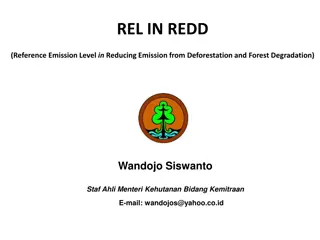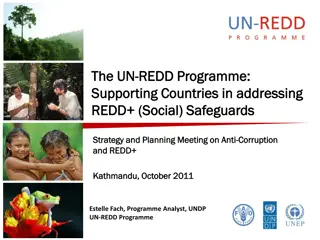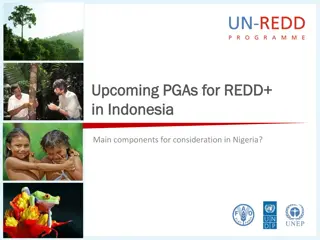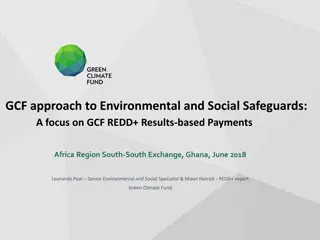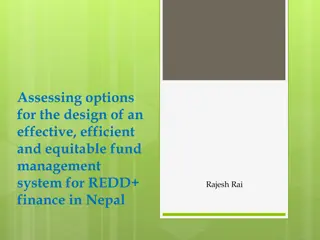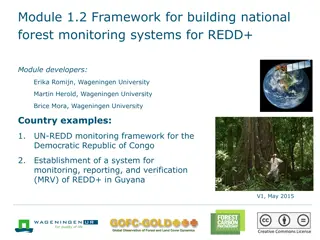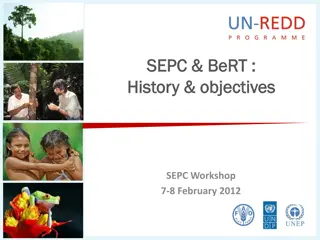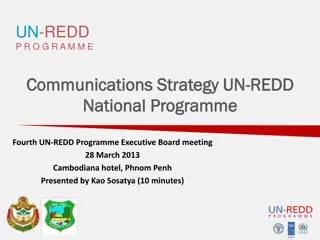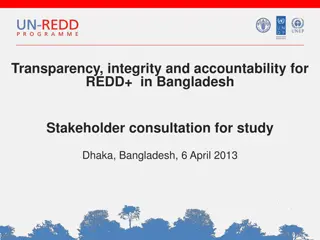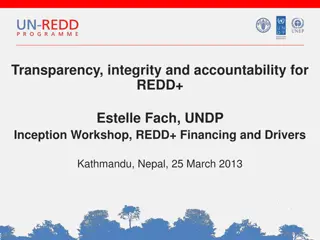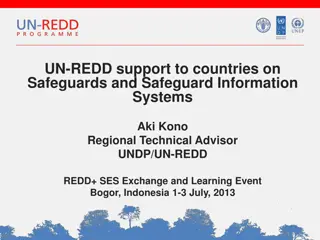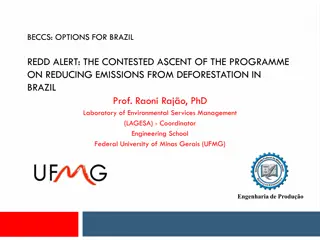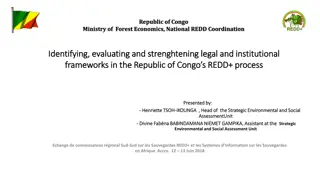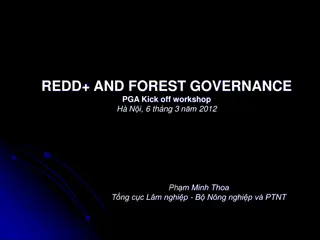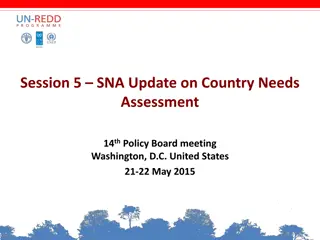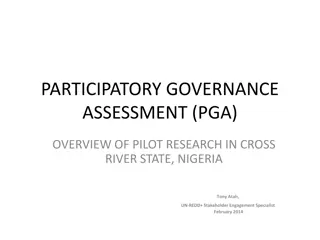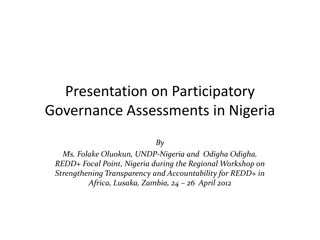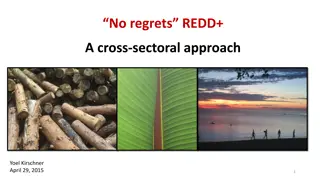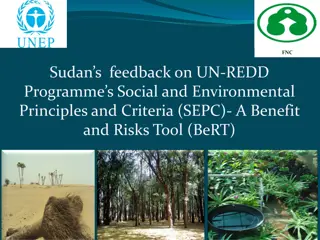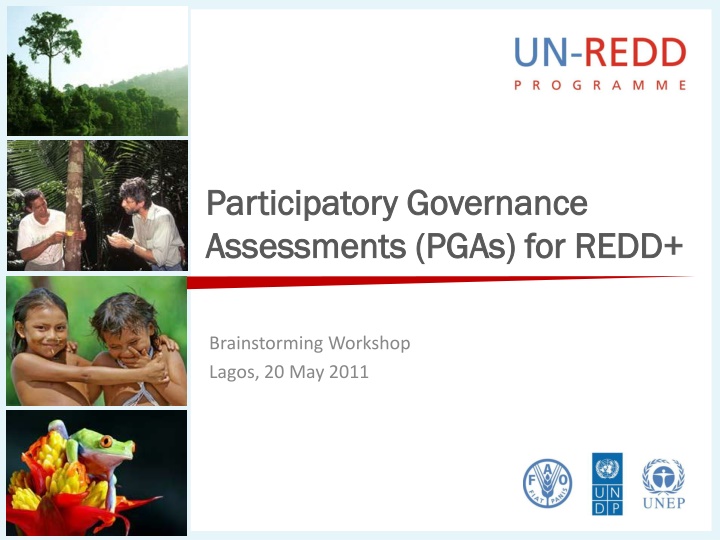
Participatory Governance Assessments (PGA) for REDD+ - Stakeholder Workshop Insights
In a brainstorming workshop in Lagos, stakeholders discussed the value of participatory governance in assessing governance for REDD+. Key elements and lessons from past assessments were shared to guide future efforts. The workshop aimed to enhance stakeholder involvement and roadmap drafting for effective assessments until the end of 2011.
Download Presentation

Please find below an Image/Link to download the presentation.
The content on the website is provided AS IS for your information and personal use only. It may not be sold, licensed, or shared on other websites without obtaining consent from the author. If you encounter any issues during the download, it is possible that the publisher has removed the file from their server.
You are allowed to download the files provided on this website for personal or commercial use, subject to the condition that they are used lawfully. All files are the property of their respective owners.
The content on the website is provided AS IS for your information and personal use only. It may not be sold, licensed, or shared on other websites without obtaining consent from the author.
E N D
Presentation Transcript
Participatory Governance Participatory Governance Assessments (PGAs) for REDD+ Assessments (PGAs) for REDD+ Brainstorming Workshop Lagos, 20 May 2011
Meeting objectives To agree on: The value-added of a participatory approach to assessing governance vs. other approaches The WHAT Some key elements to be included in the PGAs: types of methodology & governance risks to be assessed The HOW Draft roadmap : Steps & timeframe for PGAs until end of 2011 The WHO Stakeholder involvement: Who should participate & when (management, research, stakeholder consultation)
Recap on the GUG assessment Some GUG lessons of relevance for the REDD+ PGAs : Buy-in from multiple stakeholders should be secured from the outset to ensure ownership of the assessment A robust governance assessment methodology draws from multiple data sources, i.e. both administrative data ( supply of governance) and citizen data survey/focus groups ( demand of governance)
Recap on the GUG assessment Important to pilot test a methodology before starting data collection (unavailability of data, need to look for other sources, other issues to be assessed, etc.) Communication is key throughout the process (advocacy missions to states, stakeholders workshops to validate drafts, dissemination of results, etc.) Start small expand later (need for prioritization) Sustainability building institutional capacity
Dashboards Dashboards
Nigeria REDD+ Readiness Programme: How can the PGAs support the 4 outcomes? 1. Improved institutional & technical capacity at national level 1.3 Policy, legal & institutional arrangements for REDD+ established 2. Framework for REDD+ expansion across Nigeria prepared 2.1 National REDD+ challenges & potential assessed 3. Institutional & technical capacity for REDD+ in CRS strengthened 3.4 CRS REDD+ forest monitoring system operational 4. REDD+ readiness demonstrated in CRS 4.3 CRS established as a centre of excellence & learning on REDD+
1. Why do governance 1. Why do governance safeguards matter for safeguards matter for REDD+ REDD+ The Social & Environmental Principles and Criteria will provide the UN-REDD Programme with a framework to ensure that its activities promote social & environmental benefits and reduce risks from REDD+
Social and Environmental Principles and Criteria Principle 1 Principle 1 Principle 1 Democratic governance: The programme complies with standards of democratic governance Criterion 1 Ensure the integrity of fiduciary and fund management systems Criterion 2 Implement activities in a transparent and accountable manner Criterion 3 Ensure broad stakeholder participation
Social and Environmental Principles and Criteria Principle 2 Principle 2 Principle 2 Stakeholder livelihoods: The programme carefully assesses potential adverse impacts on stakeholders long-term livelihoods and mitigates effects where appropriate Criterion 4 Promote gender equality Criterion 5 Avoid involuntary resettlement Criterion 6 Respect traditional knowledge Criterion 7 Develop equitable benefit distribution systems
Why do governance safeguards matter for REDD+? If the allocation of forest or carbon rights is opaque and uncertain, or if corruption is perceived as high, stakeholders will not take the risk of forgoing the income they derive from their current uses of forest resources and REDD+ will not work. Current users need to have sufficient confidence in the REDD+ mechanism to change the way they use forest resources.
Why is it important to assess these governance safeguards? Governance data needed to: identify drivers of deforestation and forest degradation design appropriate interventions to tackle these drivers assess the effects of these interventions rectify interventions if needed, etc. Build confidence in the REDD+ mechanism Without relevant and reliable information, there will be no REDD+: Assessing governance of the forest sector and of the REDD+ mechanism itself is as important as the system designed to monitor carbon.
2. Why a 2. Why a country participatory participatory governance assessment? assessment? country- -led governance led, ,
A) What kind of accountability do we want the assessment to strengthen? External assessments / independent forest assessments Country-led / country-owned assessments Technocratic accountability to donors ( top-down approach) To maintain the credibility of an international REDD+ mechanism Meaningful accountability to domestic stakeholders ( bottom-up approach) To maintain the credibility of a national REDD+ mechanism Using international consultants or third party assessment Led by national stakeholders and researchers Alignment to international measuring needs (general indicator set applied to all countries) Alignment to national measuring needs (indicators specific to country context) Lack of ownership on recommendations lack of follow-up Strong ownership up on recommendations More likely to follow- Allows for cross-country comparisons (international rankings) Allows for sub-national comparisons (peer learning / experience-sharing)
B) Why a participatory governance assessment? By involving multiple stakeholders (government, private sector, civil society, forest-dependent communities) in both the design of an assessment system and in data collection, information is deemed more credible & relevant; a participatory process increases trust amongst the various actors (e.g. civil society & law enforcement agencies) The need for such confidence-building measures is particularly strong in the forest sector, where relationships between various actors tend to be relatively adversarial
Political level Broad multi- stakeholder consultation Steps involved in developing An assessment framework Agree on need, scope and users 1 2 Agree on principles Agree on key sector issues 3 4 Agree on sub-issues 5 Agree on a results chain Identify a basket of indicators 6 Match indicators with existing sources 7 Develop data collection instruments 8 Technical level Narrow expertise 9 Collect data Produce results 10 Broad engagement on results: Evidence-based policy-making & advocacy Institutionalization of the assessment
C) What are some useful outcomes we can expect from PGAs? 1) As a diagnostic / policy tool: Provides a robust evidence base for decision-making What are potential governance risk areas for REDD+? What are possible safeguards to address these risk areas ? 2) As an accountability tool: To mobilize public opinion, to create demand for accountability To assert the leadership of government in responding to this demand (by showing evidence of progress in governance outcomes)
C) What are some useful outcomes we can expect from PGAs? Easier (and more constructive) to measure the opposite of bad governance / corruption the effectiveness of anti-corruption mechanisms / good governance mechanisms More useful to assess the effectiveness of the remedy than to assess the seriousness of the cancer More constructive to reward good practices
Corruption risk Design of benefit distribution system Corrupt practice Anti-corruption measure Multi-stakeholder body to oversee design and implementation of BDS (Staffed? Funded? No. complaints filed? No. investigations initiated? etc.) Recourse mechanism (no. of complaints filed, no. of complaints treated, average response time, satisfaction of claimants, etc.) Undue influence (e.g. kick backs) on BDS which influences who receives REDD+ revenues & benefits Land administrati on Bribery of land administration officials to overlook competing customary claims to land titles, or to create fraudulent land titles
Corruption risk Corrupt practice Anti-corruption measure Public notification & call for public submissions for all rezoning applications & rezoning decisions Spot rezoning of land to permit (or exclude) REDD+ activities in specific areas Carbon rights Bribery of public sector officials to change the zoning of an area to allow or exclude REDD+ Bribery resulting in the loss of carbon rights for forest- dependent communities (e.g. to fraudulently create/register All applications to register carbon rights and decisions to register rights to be made publicly available
3. Planning for PGAs in the 3. Planning for PGAs in the context of REDD+ context of REDD+
Stakeholder involvement Geographical scope: CRS (all 18 LGAs?), Taraba, Ogun, Lagos, Nasarawa Who should participate & at what stage? (To be refined based on stakeholder analysis) Management structure (at national level) NTRC Creation of a PGA sub-group Draft a TOR (with concept note, roadmap, first draft of key issues ) Management structure (at state level) Forestry Commission & State CSO Platform
Stakeholder involvement Research Expert Group Methodology design at national level: State universities, research institutions / think tanks, NBS (household survey) Data collection at national level: Concerned ministries/agencies, independent experts Data collection at local level: M&E units in State Govts M&E units in LGs (e.g. forest charge offices) Local communities: e.g. 45 active Forest Management Committees (FMC) & planning for 75 FMCs across CRS Stakeholder consultation National CSO Platform State CSO platforms e.g. Cross-River State Stakeholders Forum
PGA for REDD+: A roadmap for Nigeria June July: Governance mapping on REDD+ (national expert) REDD+ stakeholder analysis: Who (key institutions & actors) will be affected negatively or positively by REDD+ activities? Map & critically review existing governance assessments (related to forests, NRM, local development) Identify key governance risks for REDD+ and identify possible safeguards (building on today s exercise)
PGA for REDD+: A roadmap for Nigeria August: Training workshop on governance assessment methodologies relevant to REDD+ Who: National-level stakeholders: NTRC PGA sub-group, expert group, national CSO platform State-level stakeholders : CRSFC, CRS Stakeholders Forum Objectives: To debrief on mapping (above) To learn about relevant methodologies To agree on critical issues to be assessed in the PGAs & first cut of possible indicators
PGA for REDD+: A roadmap for Nigeria September: Refining the draft indicator set (follow-up on workshop) By Expert Group October: Stakeholders consultations at state-level to seek feedback Revise methodology based on feedback received November December: Developing data collection instruments (survey questions, admin data collection forms, FGD guidelines) Field-testing data collection instruments (verify data sources, etc.)
GUG ELEMENTS INDICATORS MEASURING VARIABLES
Laws & regulations related to governance of the forest sector Ministry of Forestry regulations ensuring public access to forestry data, concession & revenue information Whistleblower protection legislation Freedom of the Press: laws protecting journalists & regulatory boards from interference Regulations requiring the regular publication by the police & the judiciary of enforcement activities (e.g. rates of detection, arrest, charges, seizures, convictions, sentencing, penalties) Annual audits (in line with international standards) throughout forestry-related ministries Merit-based hiring & firing policies in forestry-related mministries

